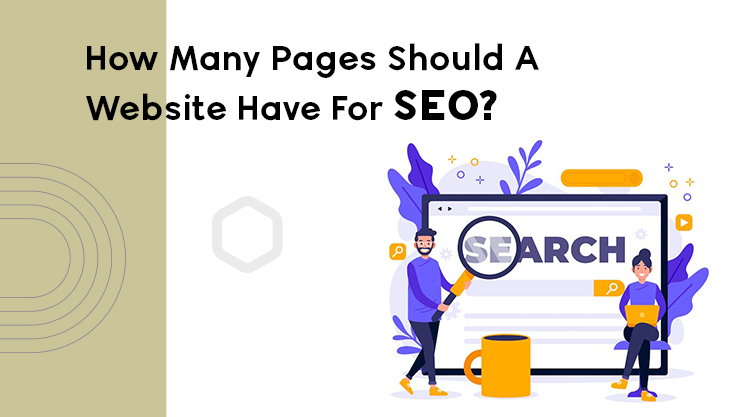Search Engine Optimisation (SEO) improves the quality and quantity of website traffic to a website or a web page from search engines. SEO targets unpaid traffic rather than direct traffic or paid traffic.
How Many Pages Should A Website Have For SEO?
This is probably the most common question people ask for a broader reach of their website. The number of pages depends on the purpose or aim of the website. At times, too much content on the website might bore the visitor.
Similarly, significantly less content might not draw the attention of people. Whether one is trying to build their first website or considering a redesign, SEO Services Company would give the appropriate suggestions. Websites are rewarded for unique, quality content that is regularly updated. Creating pages for the sake of SEO will diminish the user experience.
The Average Number Of Pages Necessary For A Website
So, if a small local business targets the local area, they would probably only need 5-10 pages. If they set up an online store, it's a different scenario. Generally, 10-30 pages of well-crafted content showcasing the products and services should be enough for most small to medium businesses. As long as they prioritise the user experience, the best results can be achieved.
Essential Pages Every Business Website Should Have
Just as every business is different, every business website will be. These ten standard web pages are a good starting point:
1. Home
2. About
3. Products or Services
4. Testimonials or Reviews
5. FAQ
6. Contact
7. Blog or News
8. Portfolio or Gallery
9. Sitemap
10. Terms & Conditions along with including privacy policy
Role of SEO Services Company
Running an SEO Audit is the best way to discover the strengths and weaknesses of the website and develop a plan to improve the visibility of the business online.
SEO audits don’t just point out areas of improvement. We provided a list of actionable tasks to put the business in front of the right users and more of them.
Why Do SEO And Pages Count For A Website?
Some websites have an advantage over others because of the vast number of pages, especially when ranking on Google. That is the turf of giants, with countless resources at their disposal to influence their SEO success.
It seems complicated to compete with these giants on their turf in terms of SEO, but it’s not true. One can rank higher than any gigantic website with tons of pages by consulting a good Website Development Company.
As long as the content is original and caters to what visitors are looking for, there is no limit to the number of pages one can have on their website. Search engines won’t penalise for too many pages as long as they serve a purpose.
The days of creating pages and pages of keyword-rich content are over. The latest algorithms now favours usability over keywords, so the right amount of content is the amount that keeps the user happy. Creating a unique page for each service you offer and the location that is served will help to establish the authority and guide visitors towards conversions.
Creating a single, content-rich page is much better than covering everything a potential customer could want to know about installing air conditioning. Hence, Google identifies the domain as an authority on this subject.
Sometimes less is more, particularly when it comes to page count. Ultimately, the website will always come out on top if it keeps the target audience in mind and prioritises its experience.
Criteria For SEO Of A Website
1. Big Websites and Small Websites
It's always the different parameters that define Google's preferences for websites. Google is naturally disposed to websites with more content. However, despite describing content as king, it does not rule on its own and in large volumes.
The big websites tend to attain high rankings because they have several pages performing well, which helps distribute SEO value across the domain if interlinking is appropriately set up. Google tends to trust websites whose pages are performing well in user experience and is more likely to start rewarding other pages from that domain.
Content can be too drawn out and redundant, offering a poor experience to users. That is why the focus is not entirely on the amount of content available on your website.
2. Quality of Content and Quantity of Content
The content must first provide invaluable information to users. Then, one can leverage the quantity of such content on the website. A website with many pages should only exist if it offers its users tons of valuable information to attain higher rankings.
Creating low-value pages with thin or tiny content to target new keywords will not be rewarded in the long run. Overall, it will devalue your site's standing as an expert in the industry if users continue to bounce off the pages.
3. Keyword
Keywords are ideas and topics that define what the content is about. In terms of SEO, they're the words and phrases that searchers enter into search engines, also called search queries.
As a website owner and content creator, one wants the keywords on the page to be relevant to what people are searching for so they have a better chance of finding the individual's content among the results.
What Are Keyword Rankings?
The amount of pages on the website is not enough to determine and retain the website's rank on Google. Numerous pages do not hold any advantage if the content they display is not relevant to users.
Google expects every website and the website's SEO efforts to show that the content on the website is an invaluable resource for its user base or niche. The first and most crucial step to becoming a big website is to cover a particular topic with distinction.
Users will become attracted by the value the website presents and all the relevant information they can easily access. So the website needs content with high quality and quantity for better reach.

















Post Comments